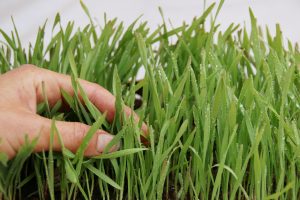Using herbicides or pesticides on your lawn can have unintended consequences. While you may not notice a decline in the quality of your turf straight away, the over-vigorous use of chemicals can have an effect on your lawn for years to come.
The problem may not be that the herbicide or pesticide attacks your plant, but it will certainly partly destroy the microbiotic life that your garden soil holds – the life that helps break down organic material into something that your lawn can digest. With repeated applications this problem can be made worse, and it may take a season or two for your soil to fully recover.
There’s no doubt that there are times when a hearty application of a herbicide or pesticide is entirely warranted, but if you play your lawn care game right, you may avoid soaking your prized patch of grass in an unhealthy, toxic concoction.
Natural weed killers, while maybe not having the punch that a full-blown herbicide will have, are a great option when used regularly, or as a preventative measure against lawn nasties.
Corn Gluten
A powdery by-product of corn processing, corn gluten is an entirely non-toxic herbicide that kills weed seedlings within just a few days of application. A pre-emergence weed control, it’s effective against most broadleaf and grass weeds.
It acts as a root inhibitor, stopping the root formation of weeds while they’re germinating, while leaving established root systems, like your lawn’s, entirely alone. Research has shown that a single application prior to weeds emerging reduced the weed survival by 60 percent. And if you apply year-on-year, this can go up to 90 percent.
Not only does corn gluten stop weeds from forming, it is also a nitrogen rich fertiliser. While the unprocessed powder form is the most common, and can be applied by hand, granulated and pelletised forms of corn gluten can also be found, allowing for the use of a spreader.
Vinegar
While corn gluten will keep emerging weeds at bay, you’ve still got the problem of pre-existing weeds to deal with. If you’re looking for an organic option, using vinegar as a spot-treatment is an excellent solution.
Your household vinegar will do the trick, and a basic recipe of five parts white vinegar/ two parts water/ one part dish soap will deal with most weed varieties. Put this mix in a hand-pump sprayer and apply directly to the weed.
Vinegar can burn any surrounding grass or plants, so be sure to be careful with your spraying. It will also only be effective on surface growth, and the roots can remain intact. If the first round of vinegar doesn’t quite get the job done, stubborn plants will have nonetheless been weakened, and one or two reapplications will usually do the job.
Citrus Oil
Another piece of weaponry in your organic arsenal is citrus oil, or in scientific terms, d-Limonene.
Often used as an additive to a vinegar spot-solution, citrus oil is a natural degreaser. It works on your weeds just as well as it works on your oven. It strips away the natural wax that the weed produces to protect itself, which leads to the plant’s dehydration, and ultimately, to its death.
Flame or Steam Treatments
If you want to feel powerful, there’s nothing quite like going over your lawn breathing fire or steam onto your weeds. Flame and steam treatments are super effective, but will damage anything they hit, so be sure to have your eye in before starting.
You’ll need to hire a purpose-built steamer or a propane flamer, so it is a matter of weighing up whether the size of the job warrants the cost.
At the end of the day, there are many options when it comes to natural weed killing. If the problem isn’t allowed to get out of hand, you may never need to fall back on toxic herbicides again.
Your turf will be thankful that you haven’t gone in with full-blown chemical warfare, and the surrounding environment and water systems will be as well.
Why not get that thumb an even darker shade of green?!


